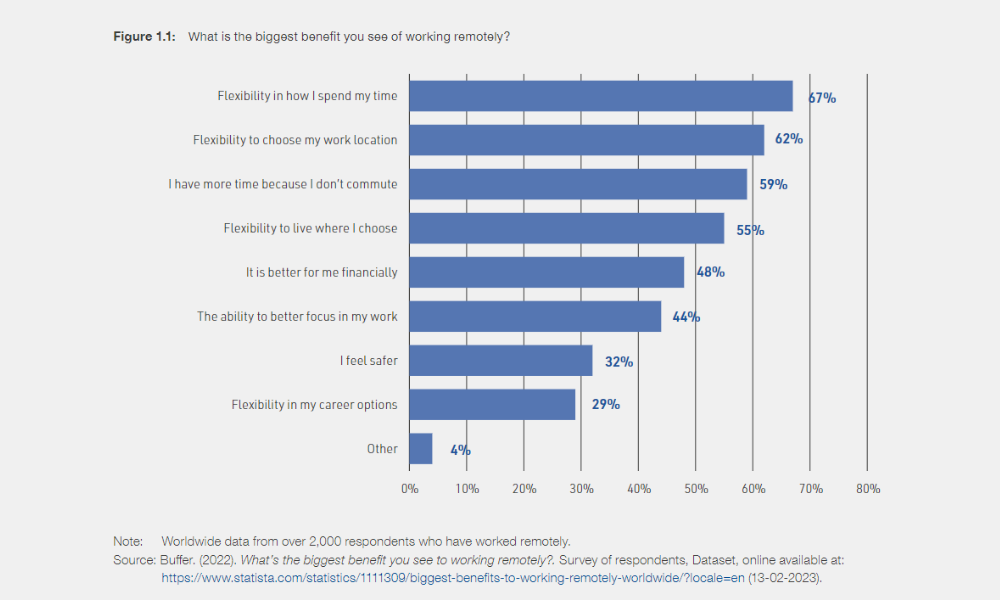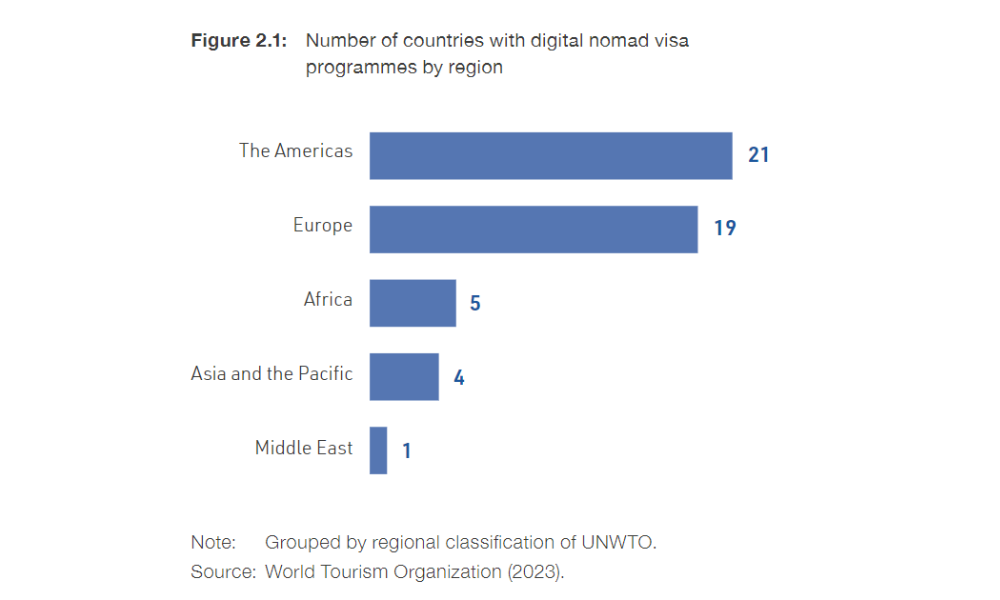More than 60 countries now have programs for these workers

Over 60 countries now offer “digital nomad visas” to accommodate the growing number of remote workers knocking on their doors, according to the latest United Nations World Tourism Organization’s brief on Digital Nomad Visas (DNVs).
“Over the past two years, employees advocated for more flexible working arrangements and some employers have responded positively. Flexible working has now become the norm for most workers, and data has demonstrated this shift,” the brief reported.
Between January and May of 2020, paid job listings for remote work rose from 3% to 18%, it said, prompting many countries to launch DNV programs to benefit from the spending power nomads can bring to their economies, among other reasons.
“Many countries around the world offer zero to minimal tax on income, because they want to attract remote workers to live there … countries are trying to attract this highly desirable talent pool, and this is the competition amongst nations,” says immigration lawyer David Cantor.
Canada competing on global level for staff
This worldwide adoption of remote work, while a good thing for employees who want to enjoy more freedom and organizations that benefit from hiring global, can increase competition for Canadian employers trying to find talent – leading some to offer flexible work arrangements and work-from-anywhere type policies as perks to potential employees.
“Canada is competing on that global playing field as well, to attract remote workers and digital nomads into their country, so the immigration system is a big part of that, as well as the fiscal system, tax incentives,” says Cantor.

Digital nomads enjoy more savings per year than full-time regular workers, the brief reported, and more than half (54%) of the digital nomads surveyed said they plan to continue that lifestyle for the next two years. Another group indicated they would like to transition to “slow travel” – spending more time in one location.
Legal considerations for digital nomads
Employees are ultimately responsible for making sure that they are welcome wherever they work, but it is still prudent for Canadian employers to have conservative policies in place around remote working, he says.
“Most of the time, there's very little liability for the companies, meaning legal liability or risk. The liability is actually on an individual employee,” says Cantor.
“The employers, of course, large and small, are considering all these compliance issues when they have employees moving around, and some have more strict protocols than others. However, at the end of the day, it's that individual who would be traveling abroad, living, working abroad, to do their due diligence to understand specifically whether or not they need work authorization in that respective country.”

Hong Kong sees high number of digital nomads
Data platform Nomad List identified Hong Kong as one of the world’s fastest growing digital nomad hubs so far this year – but what happens when a “digital nomad hub” doesn’t actually offer a visa for the rising numbers of remote workers?
“We are used to having people from overseas moving over to Hong Kong, and then staying here on a fairly permanent basis. So working visas are more common than working remotely – it's a relatively new thing,” says employment lawyer Michael Szeto, partner at ONC Lawyers in Hong Kong.
“You're still working against the old set of rules.”
Compared to some countries such as the U.S., Hong Kong’s health care is not expensive for foreigners, and there is a tax treaty between Canada and Hong Kong, although it generally wouldn’t apply to individual employees. Hong Kong’s Inland Revenue Department (IRD) is unlikely to be tracking individual digital nomads on tourist visas, Szeto says, but that doesn’t mean they never will.
Because of the tax treaty, Canadians working in Hong Kong will not be double-taxed, but they will be liable to pay tax on their income.
“If you have somebody working [remotely], then it's all unclear, because the employer in Canada would not have any files with our Inland Revenue Department, and then the employee may not even know that, ‘Oh, wait a minute, because I'm generating income here, I may be liable,’” says Szeto.
“I'm sure at some point of time they might decide, ‘This is getting a little bit out of control,’ because people are not reporting to the Inland Revenue because they are working away from home, but they are generating income in Hong Kong, so they should be paying taxes.”
Canadian employers policies for remote workers abroad
Cantor agrees with this sentiment – the risk is relatively low for employees who might want to work remotely while not necessarily on a digital nomad visa. But is the risk worth it?
And how responsible do employers want to be with their remote employees’ movements?
“Are there going to be Chinese officials who are following them around in a cafe in Hong Kong to see if they're working? Likely not, but when they cross the border, they will be asked questions,” he says.
“It is wise for employers who are going to potentially integrate remote work policies for their Canadian employees, to have a clear policy in place, saying, ‘If you're going to go to Portugal, if you're going to go to Hong Kong, and work from there, you should have work authorization.’ That's a very conservative approach. It's a prudent approach as well, because it does mitigate any potential risk.”




